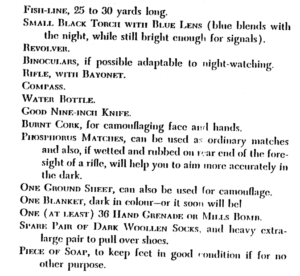Levy’s book has many interesting sections. Around page 101 he makes some suggestions as to the equipment that a guerrilla operating in a rural area might need.
His first suggestion is that the guerrilla carry a supply of money. In addition to such funds he suggests:

Monofilament fishing line had just recently been invented so it is probable that the fishing line mentioned above would be braided line. Levy describes it being used for tripwires, communication cords and for tying prisoners.
Braided line would probably be more useful as general purpose cordage.
For a modern equivalent, buy synthetic braided sea fishing line or kite string. Select a tactical colour, with grey probably being the best choice, then brown rather than green.
The binoculars reflect that Levy often states how important reconnaissance and scouting are to the guerrilla/Home guardsman.
Like his former commander, Tom Wintrigham, Levy seems to hold a low opinion of the usefulness of the bayonet.
In an earlier section, he describes probing haystacks and bushes as one of the few things bayonets are good for.
In the section on house clearing, he cautions that rifles with fixed bayonets are more trouble than they are worth and likely to get caught on furnishings, drapery and endanger comrades.
I wonder if he would have held the same views on the shorter bayonets that could be mounted on sten guns that were introduced a few years later.
In the British Army, the bayonet was to be fitted when making shots at under 300 yards, and the sights were theoretically set to compensate for this. In practice, the rifles were zeroed in the factory without bayonets fitted!
The “good nine-inch knife” is probably of the type he describes earlier in the book. This would be nine inches long, no more than three quarters of an inch wide, double edged and with a guard.
This is clearly not an issue Fairbairn-Sykes commando knife, which is several inches shorter.
“Burnt cork” is simply a bottle cork that has been burnt at one end to produce soot that can be rubbed on the skin for camouflage. It might also be used to draw symbols or similar on light surfaces.
Contrary to what you may see on some youtube videos the “carbon black” produced is not a carcinogen when used on the skin.
The use of phosphorus matches to create a night sight is a wrinkle new to me. This probably won’t work with most modern matches, but feel free to experiment.
The modern equivalent of this list item would be a fire kit as described elsewhere on this blog.
This item is also a reminder that poor visibility favours the guerrilla so that it is prudent to have firearms with sights that can be used in such conditions.
Groundcloths and blankets have been covered in several recent blog posts.
A No.36 grenade was a Mills bomb, so “or” may be a typo. Combined with a length of fishing line, this could be set up to defend the area the guerrilla was sleeping in.
The technique of wearing socks over the outside of a boot is found in other Home guard manuals.
The issue boot of the time had hobnails, making them noisy on a number of surfaces. Wearing socks over the boots allowed the wearer to move more quietly. The socks also made the boot print less distinct, making the wearer harder to track.
A study in New Zealand suggests that wearing socks over shoes gives a more secure footing in snow or ice. (Compare this to the Russian valenki)
The comment about keeping the feet in good condition reminds me of the comments of another writer on guerrilla warfare, Che Guevara.
Che describes good shoes as a “treasure” for a guerrilla and as one of his priorities.
He recommends that reserves of shoes should be accumulated and that covert workshops for the repair and manufacture of shoes be established if necessary.
In the past, British battalions included both cobblers at company level and a battalion shoemaker-sergeant among their specialists.
In the next paragraph Levy recommends woollen clothing.
Elsewhere in the book bandannas are suggested for both camouflage and disguise.